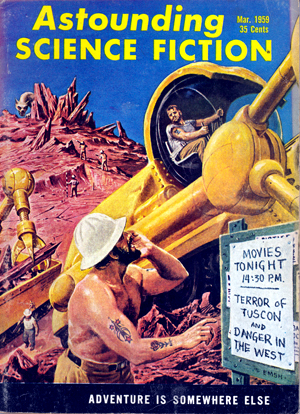|
What I hope you see is that we can define science fiction in different ways - because there are different types of science fiction. Some types fit one definition while other types fit another definition. Would setting one of Zane Grey's western novels on another, Earth-like planet really make it science fiction? Does simply placing a romance novel - which involves no science - into the future really make it science fiction? How about if our characters are aliens, humanoid or otherwise? Maybe "yes," maybe "no." It depends on whether or not we "know it when we see it." Many years ago I read a story, Despoilers of the Golden Empire, in the March 1959 issue of Astounding Science Fiction magazine. Humans travel to another world and conquer the inhabitants. The story ended with the death of the hero and the sentence "And thus died Francisco Pizzaro, the Conqueror of Peru." The story had been historical fiction, not science fiction, but because of our expectations, the name of the author (David Gordon = Randall Garrett) and the magazine in which it appeared, we all "knew it when we saw it," we "knew" that it was science fiction. If you would like to read the Project Gutenberg eBook of this story, click here. See what you think! The actual definition of "science fiction" isn't important. What is important is that we know it when we see it. And recognizing a story that we write or that we read as science fiction depends largely on the type of science fiction story that it is. Let's look at some of the types of science fiction stories. |
|||||||||
 |
|||||||||